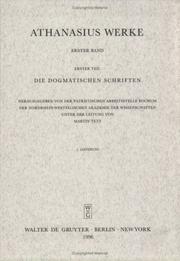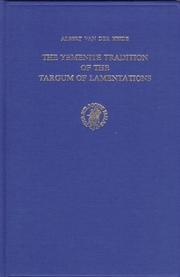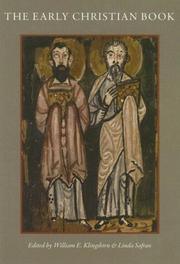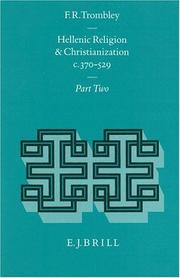| Listing 1 - 9 of 9 |
Sort by
|

ISBN: 3110151162 3110164094 3110169444 9783110227703 9783110441352 9783110703177 9783110435849 9783110705164 9783110227710 3110703173 9783110151169 3110227703 9783110169447 3110441357 9783110164091 3110435845 9783110433777 311043377X 3110227711 3110829045 3110803291 311081238X 3110705168 Year: 2016 Publisher: Berlin: de Gruyter,
Abstract | Keywords | Export | Availability | Bookmark
 Loading...
Loading...Choose an application
- Reference Manager
- EndNote
- RefWorks (Direct export to RefWorks)
A text-critical edition of the third speech against the Arians (in Greek) within the Berlin edition of Athanasius Werke. The edition presents the third speech against the Arians, which the Alexandrian bishop Athanaius composed probably between 342-345 CE. The new critical edition of this writing, which because of its dogmatic statements on Christology was often later cited in secondary sources, takes the place of Bernard de Montfaucon's edition of 1698 and the various reprints of it. Textkritische Edition der Dritten Rede gegen die Arianer (griechisch) im Rahmen der Berliner Ausgabe Athanasius Werke . Der alexandrinische Bischof Athanasius verfaßte wahrscheinlich zwischen 342 und 345 seine Dritte Rede gegen die Arianer. Die neue kritische Ausgabe dieser Schrift, die vor allem wegen ihrer dogmatischen Aussagen zur Christologie in der Folgezeit von sekundären Quellen oft zitiert wurde, ersetzt Bernard de Montfaucons Edition von 1698 und deren verschiedene Nachdrucke.
Théologie --- Histoire --- 273.4 --- 273.4 Arianisme --- Arianisme --- Théologie - Ouvrages avant 1800 --- Théologie - Histoire - ca 30-600 (Église primitive) --- Theology --- History --- Egypt
Book
ISBN: 9789004170179 9004170170 9786612602719 9047441982 1282602713 9789047441984 Year: 2008 Volume: 63 Publisher: Leiden: Brill,
Abstract | Keywords | Export | Availability | Bookmark
 Loading...
Loading...Choose an application
- Reference Manager
- EndNote
- RefWorks (Direct export to RefWorks)
Epiphanius, monastic founder and bishop of Salamis on Cyprus for almost 40 years of the fourth century, threw heart and soul into the controversies of the time and produced the 'Panarion' or 'Medicine Chest', an historical encyclopedia of sects and heresies and their refutations. Book I, concerned chiefly with Gnostic and Jewish Christian groups, deals with material which is also found in Nag Hammadi and other Gnostic writings and in such patristic authors as Irenaeus, Hippolytus et al, and reproduces documents not available elsewhere. Its translation has been found useful by students of Nag Hammadi and Gnosticism, patrologists, historians of religion, church historians, students of Judaism, and the theologically minded public.
Heresies, Christian --- Gnosticism --- -273.1*36 --- 273.1*36 Gnosis. Gnosticisme--?*36 --- Gnosis. Gnosticisme--?*36 --- -Gnosis. Gnosticisme--?*36 --- Christian heresies --- Apologetics --- 273.1*36 --- Heresies and heretics --- Heresy --- Theology, Doctrinal --- Christian sects --- Hérésies chrétiennes --- Apologétique --- Gnosticisme --- Early works to 1800. --- Ouvrages avant 1800 --- Heresies, Christian - Early works to 1800 --- Gnosticism - Early works to 1800 --- Épiphane (saint ; 0315?-0403?). Panarion --- Hérésies chrétiennes --- 30-600 (Église primitive) --- Épiphane (saint ; 0315?-0403?). Panarion --- 30-600 (Église primitive)

ISBN: 0585313989 9780585313986 9004065601 9789004065604 1590459121 9781590459126 9789004509054 9004509062 9004070257 Year: 1982 Publisher: Leiden : E.J. Brill,
Abstract | Keywords | Export | Availability | Bookmark
 Loading...
Loading...Choose an application
- Reference Manager
- EndNote
- RefWorks (Direct export to RefWorks)
Christianity and other religions --- Paganism --- Judaism --- Theology --- Religion --- Philosophy & Religion --- Christianity --- Aramaic language --- Christian theology --- Theology, Christian --- Aramean language --- Biblical Aramaic language --- Chaldaic language --- Chaldean language (Aramaic) --- Chaldee language --- Semitic languages, Northwest --- Syriac language --- Civilization, Pagan --- Heathenism --- Religions --- Syncretism (Christianity) --- History --- Relations --- Dialects --- Vocalization --- Bible. --- Criticism, Textual. --- Targum Ekhah --- Targum Lamentations --- Targum Megilat Ekhah --- Targum of Lamentations --- Jews --- Christianity and other religions. --- Education, Jewish --- Education. --- Relations. --- History. --- Education --- Judaism. --- Semites --- Roman. --- Histoire religieuse --- CHRISTIANISME --- CA 30- 600 (EGLISE PRIMITIVE)
Book
ISBN: 2757422405 2859397981 9782859397982 Year: 2003 Volume: 844 Publisher: Villeneuve d'Ascq: Presses universitaires du Septentrion,
Abstract | Keywords | Export | Availability | Bookmark
 Loading...
Loading...Choose an application
- Reference Manager
- EndNote
- RefWorks (Direct export to RefWorks)
Les études réunies sous le titre générique Le choc des cultures traduisent le questionnement scientifique de Michel Rouche qui effectua un travail de pionnier dans le champ de l’histoire du Haut Moyen Âge. La permanence de l’Antiquité dans les noms de lieux et la voirie s’étend à travers les cartulaires et les polyptyques depuis le sud de la France jusqu’aux régions du Nord. Cela se traduit par la rencontre de deux civilisations, celle de l’huile et du vin et celle de la bière et du beurre. Cette concrétisation se marque au quotidien par la nature des repas mais aussi des types de maladies. Les sociétés « barbares » se frottent et s’inspirent du modèle impérial romain, de là, naissent les grands ports de la mer du Nord mais aussi la privatisation par Dagobert des terres publiques confiées aux églises. À l’État unitaire se substitue, dans le courant du viie siècle, les régionalismes, notamment celui de l’Aquitaine. La déstructuration des repères sociaux conduit le christianisme à redéfinir un ensemble de valeurs autour de l’engagement, non dans la perspective de l’accumulation de l’Avoir par la conquête du pouvoir mais comme une libération de l’Être qui se fond dans l’Un, à l’instar des ermites. Le mariage et le célibat consacré participent d’une démarche identique dans une quête fidèle de l’Autre et dans le respect réciproque jusqu’à l’accomplissement final dans la mort, prévue et organisée. Du choc des cultures naquit ainsi un nouveau modèle social qui allait façonner la civilisation occidentale.
History --- Medieval & Renaissance Studies --- culture --- histoire --- romanité --- germanité --- chrétienté --- choc des cultures --- Antiquité --- cartulaire --- polyptyque --- type de maladie --- société barbare --- Germanic peoples --- Civilization, Medieval --- Church history --- Germains --- Civilisation médiévale --- Eglise --- Histoire --- Europe --- Rome --- Civilisation médiévale --- Rome ancienne --- Influence --- Germain --- Acculturation --- Christianisme --- Moyen âge, 476-1492 --- CIVILISATION MEDIEVALE --- CIVILISATION CHRETIENNE --- ACCULTURATION --- GERMAINS --- CHRISTIANISME ET CIVILISATION --- INFLUENCE ROMAINE --- INFLUENCE GERMANIQUE --- 30-600 (EGLISE PRIMITIVE) --- MOYEN AGE --- EUROPE --- JUSQU'A 1500

ISBN: 0813214866 9780813214863 9780813215310 0813215315 0813220645 9780813220642 Year: 2007 Publisher: Washington: Catholic university of America press,
Abstract | Keywords | Export | Availability | Bookmark
 Loading...
Loading...Choose an application
- Reference Manager
- EndNote
- RefWorks (Direct export to RefWorks)
Littérature chrétienne primitive --- Christian literature, Early --- Edition --- History and criticism. --- Publishing. --- Histoire et critique --- History and criticism --- Publishing --- -Christian literature, Early --- -276 --- 091 "01/06" --- 095 --- 7.033.1 --- Early Christian literature --- Patristic literature --- Patrologie. Patristiek --- Handschriftenkunde. Handschriftencatalogi--2e/7e eeuw. Periode 100-699 --- Merkwaardige boekbanden --- Vroegchristelijke kunst --- 7.033.1 Vroegchristelijke kunst --- 095 Merkwaardige boekbanden --- 091 "01/06" Handschriftenkunde. Handschriftencatalogi--2e/7e eeuw. Periode 100-699 --- Littérature chrétienne primitive --- 276 --- Publication and distribution --- Histoire et critique. --- Christian literature, Early - History and criticism --- Christian literature, Early - Publishing --- Bible --- Critique et exégèse --- 30-600 (Église primitive) --- Critique et exégèse --- 30-600 (Église primitive)
Book
ISSN: 05534003 ISBN: 9783110195729 3110195720 1282196537 9786612196539 3110205661 9783110205664 Year: 2008 Volume: 63 Publisher: Berlin: de Gruyter,
Abstract | Keywords | Export | Availability | Bookmark
 Loading...
Loading...Choose an application
- Reference Manager
- EndNote
- RefWorks (Direct export to RefWorks)
In seiner Kirchengeschichte vom Beginn des 4. Jh.s skizziert Eusebius von Cäsarea (ca. 260-ca. 340) erstmals umfassend die Geschichte der Christenheit von ihren Anfängen bis in seine eigene Zeit. Breiten Raum nimmt dabei die Darstellung des Kampfes gegen aufkeimende Häresien ein. Für sein Werk greift Eusebius auf älteste Quellen zurück, die uns heute z. T. nur noch aus seiner historia ecclesiastica bekannt sind. Die vorliegende Untersuchung analysiert in ihrem ersten Teil minutiös die 26 Häresiedarstellungen in Eusebius' Kirchengeschichte. Großer Wert wird dabei auf die formalen und inhaltlichen Rezeptionskriterien Eusebius' sowie seinen redaktionellen Umgang mit Quellentexten und Traditionen gelegt. Es wird gezeigt, wie Eusebius seine Quellen auswählt, abgrenzt und für seine Konzeption nutzbar macht.Der zweite Teil der Arbeit stellt die eusebianische Häreseographie systematisch dar und beschreibt deren Funktion innerhalb seiner Kirchengeschichtsschreibung. Vor dem Hintergrund der antiken Historiographie sowie der altkirchlichen Häreseologie werden die Besonderheiten der eusebianischen Vorgehensweise betrachtet und abschließend in ihrer Eigenständigkeit gewürdigt.
Christian heresies --- History --- Eusebius, --- 276 =75 EUSEBIUS CAESARIENSIS --- Griekse patrologie--EUSEBIUS CAESARIENSIS --- Christian heresies -- History -- Early church, ca. 30-600. --- Heresies, Christian. --- Caesarea, Eusebius of, --- Euseb, --- Eusèbe, --- Eusebio, --- Eusebios tou Pamphilou, --- Eusebios, --- Eusebius Pamphili, --- Eusebj Pamffil, --- Evseviĭ, --- Ewsebios Pampʻigheay, --- Qayṣarī, Yūsābiyūs, --- Yūsābiyūs al-Qaṣarī, --- Eusevios, --- Eusevios Kaisareias, --- Historia ecclesiastica. --- Christian heresies - History - Early church, ca 30-600 --- Eusebius ep. Caesariensis --- Eusebius, - of Caesarea, Bishop of Caesarea, - ca. 260-ca. 340 --- Church History. --- Eusebius of Caesarea. --- Heresiology. --- Historiography. --- History of Heresy. --- Eusèbe de Césarée (0265?-0340) --- Eusèbe de Césarée (0265?-0340). Histoire ecclésiastique --- Hérésies chrétiennes --- Hérésies juives --- Et l'hérésie --- 30-600 (Église primitive)
Periodical
ISSN: 00426032 15700720 Year: 1982 Publisher: Leiden: Amsterdam: Brill, North-Holland,
Abstract | Keywords | Export | Availability | Bookmark
 Loading...
Loading...Choose an application
- Reference Manager
- EndNote
- RefWorks (Direct export to RefWorks)
Vigiliae Christianae contains articles and short notes of an historical, cultural, linguistic or philological nature on early Christian literature written after the New Testament, as well as on Christian epigraphy and archaeology. Church and dogmatic history are dealt with as they relate to social history; Byzantine and medieval literature are treated as far as they exhibit continuity with the early Christian period.
Classical Latin literature --- History of civilization --- Patrology --- Religious studies --- Christian literature, Early --- Church history --- Littérature chrétienne primitive --- Eglise --- Periodicals --- Périodiques --- Histoire --- Littérature chrétienne primitive --- Église --- 27 <05> --- 281.3 --- #TS:KOMA --- Kerkgeschiedenis--Tijdschriften --- Kerk voor het Concilie van Nicea:--100 tot 325 --- Arts and Humanities --- General and Others --- Religion --- Arts and Humanities. --- General and Others. --- 281.3 Kerk voor het Concilie van Nicea:--100 tot 325 --- Périodiques --- BRILL-E EBSCOASP-E EJHISTO EJLITTE EJRELIG EPUB-ALPHA-V EPUB-PER-FT JSTOR-E --- Christianity --- Ecclesiastical history --- History, Church --- History, Ecclesiastical --- Early Christian literature --- Patristic literature --- History --- Christian literature, Early - Periodicals --- Church history - Primitive and early church, ca. 30-600 - Periodicals --- Littérature chrétienne primitive - Périodiques --- Eglise - Histoire - ca. 30-600 (Eglise primitive) - Périodiques
Book
ISBN: 0801895227 9780801895227 9780801891427 0801891426 Year: 2009 Publisher: Baltimore : Johns Hopkins University Press,
Abstract | Keywords | Export | Availability | Bookmark
 Loading...
Loading...Choose an application
- Reference Manager
- EndNote
- RefWorks (Direct export to RefWorks)
Their long experience in medical charity led to the creation of the first hospitals, a singular Christian contribution to health care.
History, Ancient. --- Delivery of Health Care --- Religion and Medicine. --- Christianity --- Church history --- Medicine --- Ecclesiastical history --- History, Church --- History, Ecclesiastical --- History --- Medicine and religion --- Religion and medicine --- Pastoral medicine --- Delivery of health care --- Delivery of medical care --- Health care --- Health care delivery --- Health services --- Healthcare --- Medical and health care industry --- Medical services --- Personal health services --- Public health --- Ancient history --- Ancient world history --- World history --- Apostolic Church --- Church, Apostolic --- Early Christianity --- Early church --- Primitive and early church --- Primitive Christianity --- Fathers of the church --- Great Apostasy (Mormon doctrine) --- Health Workforce --- history. --- Religious aspects --- 27 "00/09" --- 61 <09> --- Kerkgeschiedenis--eerste millennium AD. Eerste millennium na J.C.--(variabel) --- Geschiedenis van de geneeskunde --- Médecine --- Eglise --- Histoire --- Jusqu'à 1500 --- Aspect religieux --- Religion and Medicine --- History, Ancient --- Médecine --- Christianisme --- Jusqu'à 1500 --- 30-600 (Église primitive) --- 30-600 (Église primitive)

ISBN: 9004096248 9004096914 9004096922 9004276785 9004276777 9004274812 1306808502 9004274790 1306808510 9789004096929 9789004096912 9789004096240 9789004276772 9789004276789 Year: 1995 Volume: 115 Publisher: Leiden ; New York : E.J. Brill.
Abstract | Keywords | Export | Availability | Bookmark
 Loading...
Loading...Choose an application
- Reference Manager
- EndNote
- RefWorks (Direct export to RefWorks)
This work discusses the decline of Greek religion and the christianization of town and countryside in the eastern Roman Empire between the death of Julian the Apostate and the laws of Justinian the Great against paganism, c. 370-529. It examines such questions as the effect of the laws against sacrifice and sorcery, temple conversions, the degradation of pagan gods into daimones , the christianization of rite, and the social, political and economic background of conversion to Christianity. Several local contexts are examined in great detail: Gaza, Athens, Alexandria, Aphrodisias, central Asia Minor, northern Syria, the Nile basin, and the province of Arabia. It lays particular emphasis on the criticism of epigraphy, legal evidence, and hagiographic texts, and traces the demographic growth of Christianity and the chronology of this process in select local contexts. It also seeks to understand the behavioral patterns of conversion.
Religion romaine --- #GROL:SEMI-27'03/05' --- 292.15 --- 270.2 --- Religion Classical Greek and Roman Interreligious relations --- Religion Christian Church history 325 - 787 --- Christian religion --- Comparative religion --- anno 400-499 --- anno 300-399 --- anno 500-599 --- Christianity and other religions --- Church history --- Greek. --- Roman. --- Egypt --- Greece --- Middle East --- Rome --- Religion. --- Christianisme --- Eglise --- Religion grecque --- Hellenisme --- Relations --- Histoire --- Influence --- Greek --- Roman --- Religion --- Primitive and early church, ca. 30-600 A.D. --- Christianity and other religions. --- Christianity. --- Greeks --- Interfaith relations. --- Romans --- Primitive and early church. --- 30 - 600 --- Christianity --- Syncretism (Christianity) --- Religions --- Apostolic Church --- Church, Apostolic --- Early Christianity --- Early church --- Primitive and early church --- Primitive Christianity --- Fathers of the church --- Great Apostasy (Mormon doctrine) --- History --- Early Church Period --- Primitive and Early Church Period --- Religion, Primitive --- Atheism --- Irreligion --- Theology --- Egypt. --- Greece. --- Middle East. --- Rome (Empire) --- Rim --- Roman Empire --- Roman Republic --- Romi (Empire) --- Byzantine Empire --- Italy --- Asia, Western --- Eastern Mediterranean --- Eastern Mediterranean Region --- Fertile Crescent --- Levant --- Mideast --- Near East --- South West --- Southwest Asia --- West Asia --- Western Asia --- Asia --- al-Yūnān --- Ancient Greece --- Ellada --- Ellas --- Ellēnikē Dēmokratia --- Elliniki Dimokratia --- Grčija --- Grèce --- Grecia --- Gret͡sii͡ --- Griechenland --- Hellada --- Hellas --- Hellenic Republic --- Hellēnikē Dēmokratia --- Kingdom of Greece --- République hellénique --- Royaume de Grèce --- Vasileion tēs Hellados --- Xila --- Yaṿan --- Yūnān --- A.R.E. --- Ägypten --- Ancient Egypt --- Arab Republic of Egypt --- ARE --- Egipat --- Egipet --- Egipt --- Egiptos --- Egitto --- Égypte --- Egypten --- Egypti --- Ejiputo --- Gouvernement royal égyptien --- Ijiptʻ --- Jumhūrīyat Miṣr al-ʻArabīyah --- Khēmi --- Maṣr --- Miṣr --- Misri --- Mitsrayim --- United Arab Republic --- Christianisme - Relations - Religion grecque --- Christianisme - Relations - Religion romaine --- Eglise - Histoire - ca 30-600 (Eglise primitive) --- Hellenisme - Influence - Histoire --- 30-600.
| Listing 1 - 9 of 9 |
Sort by
|

 Search
Search Feedback
Feedback About UniCat
About UniCat  Help
Help News
News